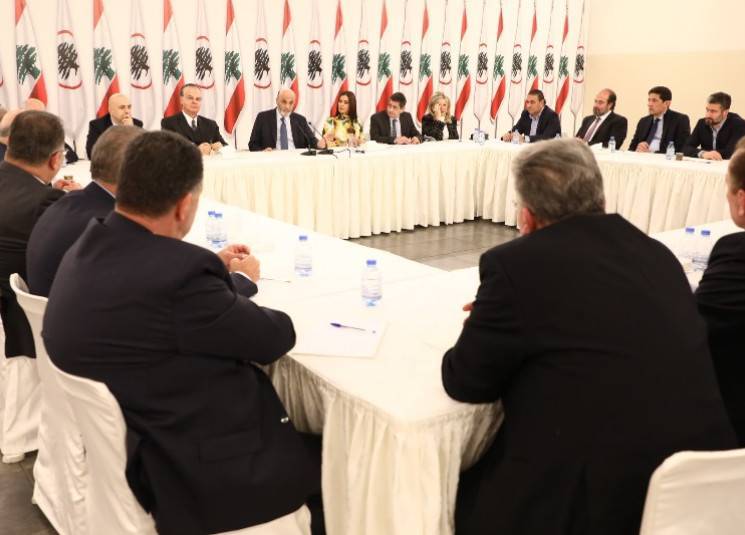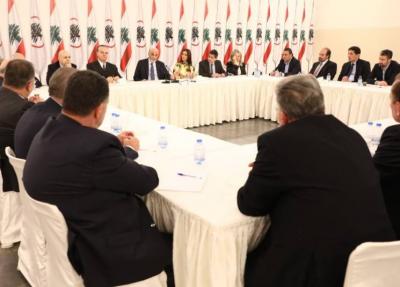The "Strong Republic" bloc pointed out in a statement issued after its regular meeting yesterday, Monday, via Zoom, that "Charles Malik says that only free and peaceful dialogue, based on mutual respect and away from all pressure, terrorism, or threats, has any chance of success. The conditions for dialogue are five: mutual respect among the interlocutors, the freedom to disclose everything, respecting the truth without any distortion in what is presented and said, adopting procedural rules for dialogue that apply equally to all interlocutors, and the will to reach an agreement. If any of these five conditions are violated, the dialogue is rendered void."
The statement continued: "From the fifth condition, we affirm that dialogue is a demand to arrive at solutions and results. What is required is serious dialogue that meets the conditions for its success, and not a mere farce to endorse the existing status quo. What has been happening since 2006 to date regarding dialogue are merely distasteful and exposed theatrics."
It stressed that "dialogue was created to resolve disputes and disagreements, and we are not against it as a principle and human value; rather, we have always supported dialogue of life and thought. However, we oppose dialogue merely for the sake of dialogue and using it as a means to cover up the reality on the ground, especially with a faction that has proven, through long experience, that it turns against everything agreed upon and refuses to discuss the fundamental reasons behind the Lebanese crisis. We are also against dialogue, secondly, in an inappropriate context, such as in presidential elections that the constitution clearly stipulates should take place in Parliament, not around a dialogue table, which transforms the Parliament into a Loya Jirga whose role is to ratify what is decided at the dialogue table, contrary to the constitution."
The bloc highlighted that "despite the countless negatives associated with the dialogue process that began in 2006, from promises of a calm summer to signing the 'Baabda Declaration', to the call to 'Let it be, and drink its water', and everything in between and afterward regarding the failure to implement what was agreed upon, up to dialogue about what the resistance cannot impose, excluding what does not fit its agenda, such as its illegal arms, and not to mention the maneuvers and attempts to whitewash its image before local and international public opinion, claiming it invites to dialogue and extends a hand while, in reality, it is buying time to achieve its authoritarian goals and further fragment the country."
It noted that "it has become clear that the resistance resorts to imposing a fait accompli outside the institutions, to eliminate their role when it wishes and return to them when it guarantees the results of democratic mechanisms through its undemocratic means—imposition, intimidation, enticing, and elimination—to use them in favor of its hegemony project over Lebanon."
The statement emphasized that "it is known that dialogue on the presidential issue means deviating from constitutional text and heading towards establishing a new custom contrary to the constitution because presidential elections take place in Parliament according to known electoral mechanisms. It is evident that the resistance, which seized the obstructive third in the Doha Agreement contrary to the constitution, seeks to entrench sectarian agreements instead of national Christian-Islamic pacts, and now insists on dialogue as a means to establish it as a pathway for all presidential elections instead of Parliament, which means nullifying the role of the Parliament and abolishing the electoral process."
It stated, "As for the insistence on dialogue, it is to cover their equation of candidates or vacancy and attempt to beautify it, as this equation, under the inability to translate and justify it, places it in a position where it openly imposes a president on its terms or else there will be a vacancy. Therefore, it decided to replace it with dialogue without conceding its equation, thinking that this way it cornered its opponents and justified its obstruction."
The bloc concluded that "it is clear that the resistance does not want to risk presidential elections by relying on the electoral mechanism that may lead to electing a president it opposes. If, for example, the quorum had not been obstructed in the 12th session on June 14, the former minister Jihad Azour would have been elected as president. It is certain that what the resistance has been doing since 2005 is part of the continued erosion of the country and the attempt to entrench customs that violate the constitution. What it is trying to entrench today makes dialogue a gateway to presidential elections, and any approval for dialogue under the presidential pretext means the elimination of Parliament's role in electing the president, and that, in any upcoming presidential elections, the dialogue will be the conduit for electing the president, not Parliament."
It concluded with the demand: "The requirement is always to implement the constitution, not to rely on compromises that lead to further undermining this constitution, in a manner that suggests ‘give us dialogue and take open sessions, while the constitution states one electoral session in consecutive rounds until the president is elected.’"




